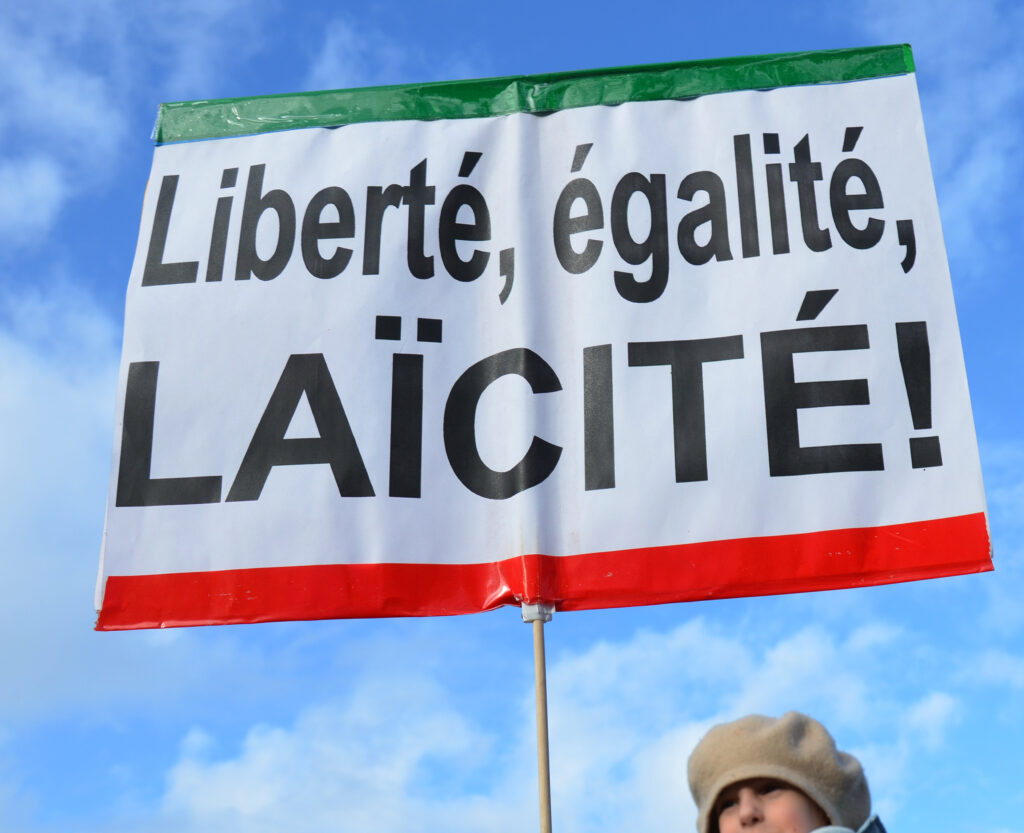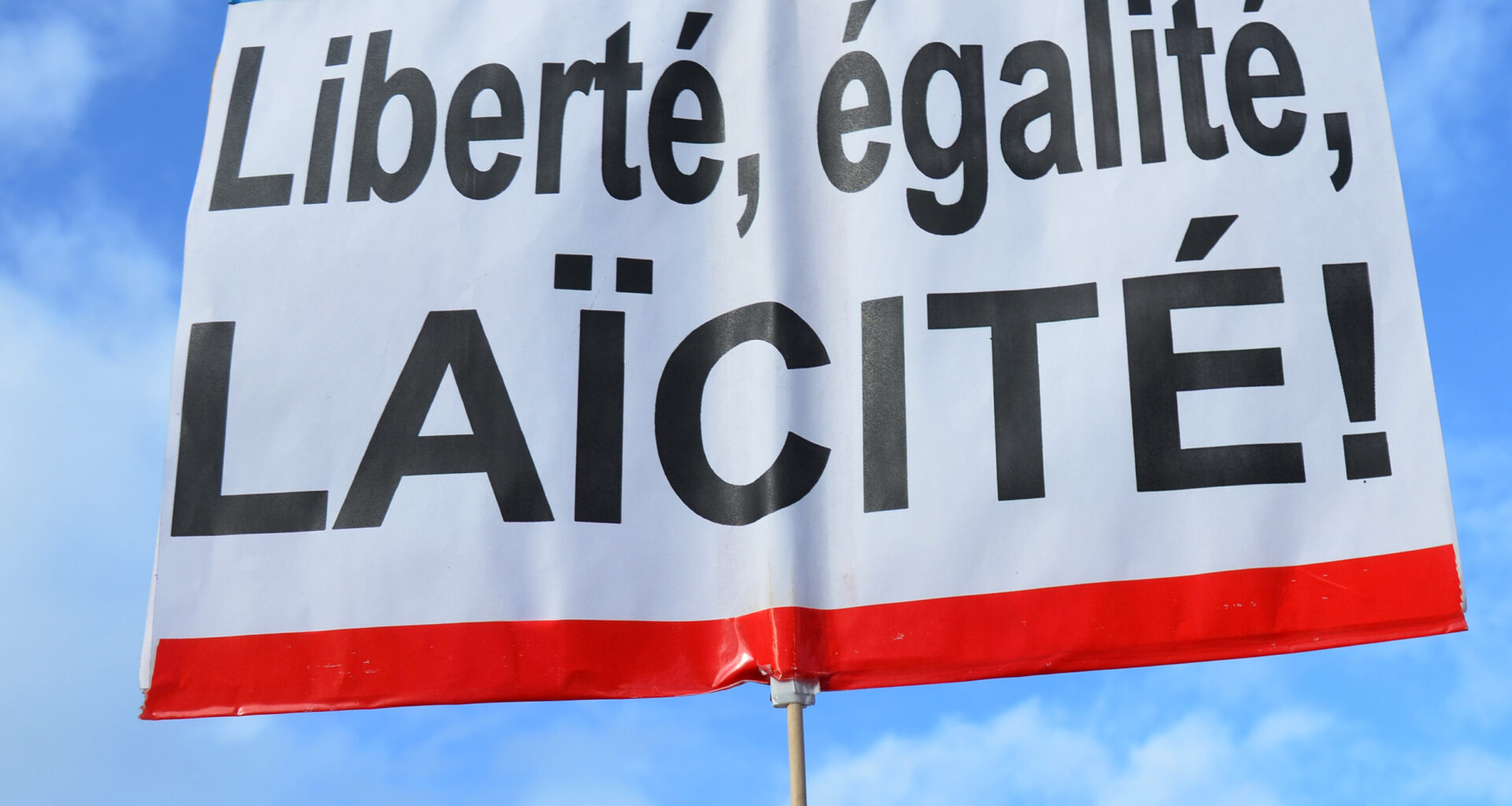
Official secular states are falling like dominoes into the hands of radical religionists the world over. Many secular Israelis say they would rather cope with anti-Semitic backlash overseas than live under the incumbent ultra-Judaic regime. India, an erstwhile battleground for minority and majority fundamentalisms, is now firmly in the grip of Hindutvaadis (proponents of Hindutva or Hindu nationalism), who control the state machinery. There are demands for death and apartheid for sacrilege against Islam in Bangladesh. Even the US, the ‘leader of the free world’, cannot guarantee anatomical freedom for half of its population owing to the pervasiveness of conservative Christian beliefs about abortion.
In these countries and others, not only have secular spaces been usurped by religion, but the term ‘secularism’ itself has been declared anathema by the religionists. Meanwhile, the self-avowed defendants of secularism – especially the left-wing progressives, depicted as part of the liberal elite by their detractors, who are accustomed to combatting philosophical challenges with condescension more than contemplation – are religiously refusing to accept that their own privileging of regressive ideas is analogous to intolerant religious dogma. The tendency of left-wing progressives to equate satire on Islam with persecution of Muslims, or to conjure up unsubstantiated allegations of ‘Islamophobia’, reveals an embrace of Islamic dogma which is part of a comprehensive failure to strengthen the separation of religion and state.
Amidst all this apparent backtracking, left-leaning progressives of this persuasion have arguably made a pariah out of the only rendition of secularism that actually is uncompromisingly neutral on religion: laïcité.
Every time French authorities treat Islam like other religions, the blame is laid at the door of laïcité. This simple refusal to allow for Islamic exceptionalism might as well be the effective definition of ‘Islamophobia’. Whether it is the anti-radicalism bill, the enforcement of the ban on religious symbols in public institutions, or the 1905 law that laid the foundation of the separation of church and state, none of the French legislative provisions explicitly mentions Islam and all are equally applicable to all religions. If an egalitarian law impacts some groups of ideological adherents more so than others, it only serves to highlight the expansionist and exceptionalist tendencies of those ideologies, rather than any intrinsic discrimination in policy. Yet this remains a blind spot for those Anglo-American progressive secularists, whose treatment of anti-secularist ideas sometimes seems to depend on nothing more than the numerical strength of their proponents.
The fundamental difference between classical Anglo-Saxon secularism and French laïcité lies in the way in which they separate state and religion. Anglo-Saxon secularism aspires to separate the state from the individual, or communal, religious space, while French laïcité aims to separate religion from statecraft. The differences are rooted in the countries’ respective histories of secularisation, and their corresponding sociological evolutions. The US and the UK have sought the post-Enlightenment harmonisation of Christian sects, while France predominantly occupied itself with overturning the monopoly of the Catholic Church in the nineteenth century.
The Indian version of secularism is even more passive and accommodationist. Different religious communities have been allowed to govern their own exclusive matters: this in effect creates separate communal spheres which have adopted an apparent commitment, at least temporarily, towards coexistence, in line with the pluralistic, polytheistic, traditions of the Indian subcontinent. However, while today’s multi-religious societies pose a challenge that the Anglo-Saxon and Indian brands were supposedly designed to address, it is French laïcité that offers the best solution, because it would eliminate religion from any level of governance altogether, and so in effect would create more robust checks, both between and within religions.
Paradoxically, by officially distinguishing between communities based on religious beliefs in their bid to maintain harmony between them, both the Anglo-Saxon and Indian brands of secularism actually institutionalise religious separation. This in turn empowers radical ideologues within these communities to uphold their religion’s exceptionalism, because they are able to define its adherents through the narrowest interpretation of their ideology and demand others to respect this strain in the ‘sprit of secularism’. For instance, the Islamic ban on the depiction of Muhammad – a Salafi enforcement which was not originally in other interpretations of Islam – has been dutifully lapped up by many in the Anglo-Saxon ‘progressive elite’, who are terrified of offending ‘all Muslims’. Furthermore, this buttressing of ideological lines abandons minorities and the marginalised within those communities to their fate, as exemplified by the Muslim women being victimised by sharia rulings even in the West.
Elsewhere, secularism and religious heritage are coalescing to forge national identities and ultimately bring about theological takeovers. Unlike the adherents of the other two Abrahamic faiths, secular and even nonbelieving Jews have historically overcome identitarian dissonance by staking their claim to being an ethnoreligious group. However, given that this belief itself is rooted in the orthodox, religious Judaic tradition of matrilineal descent, the transformation of Israel from a state for the (ethnic) Jewish people to one for (religious) adherents of Judaism – especially after decades of the sustained privileging of ultra-orthodox Jews – was inevitable.
In India, the land of Sanatana Dharma, or Vedic religions, which in themselves are scripturally devoid of the monotheistic rigidity of Abrahamic texts, it is the Hindutva, or ‘Hinduness’, that is being peddled by the majoritarian ideologues as an uncharacteristically monolithic definition of an Indian. This in turn elevates Hindu beliefs over others even unofficially. Sri Lanka, meanwhile, has facilitated the rise of radical Buddhists by describing Buddhist heritage as the supreme binding force of the nation in the state’s constitution. This illustrates the way in which the Dharmic religions of the Indian subcontinent too can be weaponised to enforce a nationalistic religious hegemony and erode longstanding traditions of secularism. Myanmar has taken this weaponisation to murderous extremes, prompting the ethnic cleansing of Rohingya Muslims.
Laïcité provides safeguards against any consolidation of religious dominance by barring the manifestation of any religion, majority or minority, in public institutions. As such, it in effect treats religion like any other ideology. The fundamental failure of all other brands of secularism is that they allow exceptional behaviour in the name of a religious ideology that they would not allow on the basis of other ideologies, traditions, or individual preferences. Judges or teachers are not allowed to wear the insignia of political parties, because of the suggestion of bias that they would create; the wearing of religious emblems in public institutions should not be treated any differently. To make exceptions for religion where they would not be allowed for political beliefs or personal prejudices is to give religions a truly privileged status, which undermines a state’s claim to be neutral in such matters of conscience.
Laïcité is also often misinterpreted as an exclusively French obsession or colonial hangover, which France has exercised over its Arab or Muslim subjects. But this misinterpretation dismisses the various versions of secularism that have thrived across the world. The tradition of laïcité has sustained secular ideals in Tunisia and Lebanon; secularists in the latter have even organised ‘Laique Pride’ protests to insist that only a more assertive secularism can undo the religious and sectarian fault lines dividing their society. Making the state laico in 2010 helped Mexico to decriminalise abortion last year; as a result, many American women have travelled down south to exercise their fundamental human right to bodily autonomy.
Albania overcame the Millet institutionalisation of religious communities, an Ottoman remnant, through the creation of shtet laik, ‘laicist state’, and a strict neutrality on religion. The maintenance of shtet laik also helped the Muslim-majority European state overcome the state-sanctioned atheism and religious repression of the Communist era, which has seen an Islamist resurgence in many other Soviet states since the fall of the USSR. The unflinching neutrality emphasised by laïcité, and its many proponents, also extends to anti-religious expressions. It is critical to stress this point, since an active crackdown on religious beliefs undoes impartiality. In other words, privileging atheism above religion, in policymaking and statecraft, is no better than the other way round.
Similarly, it is crucial to note that merely enshrining laïcité in the constitution is no guarantee of sustained state neutrality on religion. The example of Turkey shows how any reversal in staunch secularism, whether in the name of nationalism or misdirected liberalism, eventually paves the way for a religious takeover. President Recep Tayyip Erdoğan is the man who spearheaded Turkey’s Islamisation; Kemal Kılıçdaroğlu is the leader of the Mustafa Kemal Atatürk-founded Republican People’s Party (CHP) that created Turkey on the founding principle of laiklik, or laicism. As the two rivals participated in the runoff election on 28th May – one of the most critical elections of recent times – even a cursory debate on the country’s secularism was not being held. This was because the Turkish opposition had surrendered in advance to the nation’s conservatives, who want more Islam in governance and consider it integral to Turkish identity. Such an attitude has unsurprisingly eroded religious tolerance and subjugated minorities in the country once deemed the benchmark for Muslim secularism.
The reason different versions of laicism have been misconstrued as ‘illiberal’, whether in Turkey or France, is due not least to the general capitulation among progressives to identity politics. This attitude not only reinforces communitarian boundaries, but earmarks certain minorities as designated vote banks. Whether it is the Labour or Democratic parties in the Anglo-American sphere, or the Congress in India, traditionally left-wing parties have, not unlike their opponents on the right, sought to profit from a communal segmentation, with both ends of the political spectrum offering contrasting, but similarly damaging, perversions of secularism. This divisive approach has helped create a world where both the rejection of religious ritualism, and the embrace of religious identitarianism, are simultaneously rising, as demagogues within religious communities successfully exploit the loopholes in submissive secularism. Religious ideologies do not only threaten the principle of equality before the law, but have now mutated into forms of religiously-grounded nationalism. This makes it more critical than ever to confine the manifestation of religion, as of all other ideological manifestations, to its designated sphere.
Where ‘religious tolerance’ has become synonymous with tolerating religious intolerance, a form of secularism that is sustainable and that treats everyone equally can only be attained by making religion irrelevant in all matters of public policy. This is what the supporters of laïcité maintain, notwithstanding various shortcomings in its implementation in states like France. The ideologues who champion the more selective and opportunistic brands of secularism fear that making religion inconsequential might render their own positions irrelevant. It is thus crucial to safeguard secularism from manipulation, whether by progressives, religious ideologues or nationalists. The only way that this can be done is by upholding truly ‘laicist’ neutrality on religion.
Enjoy this article? Subscribe to our free fortnightly newsletter for the latest updates on freethought.








Your email address will not be published. Comments are subject to our Community Guidelines. Required fields are marked *
Donate